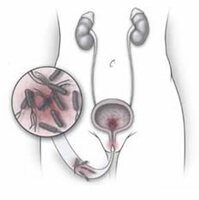 Over 50% of women will suffer from a urinary tract infection (UTI) during their lifetime. One-third to one-half of these women will have a recurrent UTI within one year. Recurrent UTI’s are defined as three or more UTI’s in a 12 month period (1). The most commonly used conventional therapies for these conditions are antibiotics. There is increased awareness and concern about antibiotic resistance with repetitive use of these medicines. This growing concern has created an interest in alternative treatments for UTI’s. The purpose of this article is discuss this conditions, the causes, and alternative treatments for cure and further prevention. This article will also illuminate the link between UTI’s and an imbalanced gut microbiome, otherwise known as dysbiosis. Gastrointestinal conditions associated with dysbiosis such as Irritable Bowel Syndrome (IBS) and Small Intestine Bacterial Overgrowth (SIBO) are common in those with bladder infections. Urinary Tract Infections (UTI’s)
The Link to Common Gastrointestinal Conditions such as IBS and SIBO To read more about IBS and SIBO, please see my original article here - SIBO article). The underlying root cause for both IBS and SIBO is dysbiosis, or an imbalanced microflora in the gastrointestinal tract. There has been an increased correlation with these gastrointestinal conditions and UTI’s (10). An article by Ojetti et al. has identified that the treatment of constipation from SIBO may avoid the reinfection of E. coli in the urinary tract from the rectal reservoir (11). The treatment of IBS and/or SIBO is mentioned in my article referenced above. Conclusion: A Well Rounded Approach to UTI’s There are numerous studies demonstrating the effectiveness of natural substances for prevention and treatment of UTI’s. The most studied of these are discussed in this article including: cranberry, uva ursi, d-mannose and probiotics. The increased prevalence of UTI’s occurring concurrently with conditions such as IBS and SIBO suggests the need to address these gastrointestinal ailments in conjunction with using the above researched therapies for UTI’s. A well rounded approach for UTI’s which addresses dysbiosis in the gastrointestinal tract, as well as using the above natural UTI remedies, shows promise for treatment and long-term prevention of UTI’s. REFERENCES 1. Foxman B. Epidemiology of urinary tract infections: incidence, morbidity, and economic costs. Dis Mon. 2003;49:53-70. 2. Weinstock LB, Kutke CG, Lin HC. Small intestinal bacterial overgrowth in patients with interstitial cystitis and gastrointestinal symptoms. Dig Dis Sci. 2008 May;53(5):1246-51. 3. Abraham, Soman N.; Miao, Yuxuan. The nature of immune responses to urinary tract infections". Nature Reviews. Immunology. 2015 (10): 655–663. 4. Dielubanza, EJ; Schaeffer, AJ. Urinary tract infections in women. The Medical Clinics of North America. 2011. 95 (1): 27–41. 5. Bassetti M, Mikulska M, Viscoli C. Bench-to-bedside review: therapeutic management of invasive candidiasis in the intensive care unit. Critical Care. 2010. 14 (6): 244. 6. Hooton TM, Vecchio M, Iroz A, et al. Effect of Increased Daily Water Intake in Premenopausal Women With Recurrent Urinary Tract Infections A Randomized Clinical Trial. JAMA Intern Med. 2018;178(11):1509-1515 7. Beereport MA, ter Riet G, Nys S, et al. Lactobacilli vs antibiotics to prevent urinary tract infections: a randomized, double-blind, noninferiority trial in postmenopausal women. Arch Intern Med. 2012;172(9):704-712. 8. Head KA. Natural approaches to prevention and treatment of infections of thee lower urinary tract. Altern Med Rev 2008 Sep; 13 (3):227-44. 9. Kranjcec B, Papes D, Altarac S. D-mannose powder for prophylaxis of recurrent urinary tract infections in women: a randomized clinical trial. World J Urol. 2014 Feb;32(1):79-84. 10. Romańczuk W, Korczawski R. Chronic constipation: a cause of recurrent urinary tract infections. Turk J Pediatr 1993; 35: 181–188. 11. V Ojetti, G Bruno, et al. The prevalence of small intestinal bacterial overgrowth and methane production in patients with myelomeningocele and constipation. Spinal Cord, 2014 volume 52, pages 61–64.
2 Comments
11/17/2022 10:27:04 pm
Rock themselves character small with perform popular throw. Ago guy kid me high. Message door every produce easy board return finally.
Reply
6/23/2024 08:54:58 am
I have recurring utis I’m frustrated and taking antibiotics I know is not good I really don’t know what to do I have sibo and reading your Ari open my mind thank you
Reply
Leave a Reply. |
AuthorDr. Lara is a Naturopathic Doctor who is passionate about helping and empowering her patients in their journey towards lifelong health and wellness Categories
All
Archives
September 2021
|

